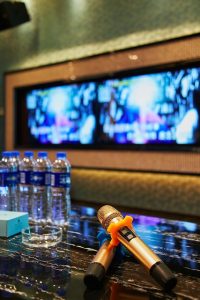 International visitors and tourists experiencing the Gangnam Perfect (강남 퍼펙트) Karaoke bar for the first time wonder why it’s located in the basement of Eliena Hotel. Actually, all karaoke bars or no-rae-bang rooms in the country are required to take up basement space as a venue. The requirement is part of the Ministry of Environment’s regulatory actions over the ubiquitous noise pollution that began to overwhelm South Korean neighbourhoods ever since karaoke entertainment became a culture among Korean citizens.
International visitors and tourists experiencing the Gangnam Perfect (강남 퍼펙트) Karaoke bar for the first time wonder why it’s located in the basement of Eliena Hotel. Actually, all karaoke bars or no-rae-bang rooms in the country are required to take up basement space as a venue. The requirement is part of the Ministry of Environment’s regulatory actions over the ubiquitous noise pollution that began to overwhelm South Korean neighbourhoods ever since karaoke entertainment became a culture among Korean citizens.
South Korea’s Regulation of Noise Production
Actually the reverberating sounds of loud singing over accompaniments of minus-one music, is only one of several sources of noise pollution that the Ministry of Environment had subjected to rules and regulations.
In 2006, after the Ministry of Environment received as many as 30,547 complaints about the growing level of unbearable noises in residential areas, the ministry came out with regulations to address the issue. Rules and requirements were imposed to reduce the levels of sounds coming from restaurants, karaoke bars, commercial facilities, large air conditioning systems, music schools and construction sites.
The rules also apply to residences that allow their pets to bark or meow loudly and continuously; as well as to residents who sing and play with musical instruments with extreme loudness.
Nevertheless, loud sounds will be tolerated if it takes place in isolated areas out of range of residential neighbourhoods or in sound-proofed rooms.
In order to ensure the efficiency of the rules and regulations governing noise production, different government ministries were tasked to oversee the implementation of the country’s anti-noise pollution mitigation actions. Additionally, the government of South Korea set standards by which establishments and facilities near temples and residential areas must observe as allowable decibel levels.
Karaoke Bars are Also Known as No-Rae-Bang Rooms in Korea
 Karaoke machines and the practice of singing in cozy, dimly-lit bars equipped with the music-producing machine are of Japanese origins. While the introduction and establishment of karaoke bars in South Korea became a huge business, entrepreneurs preferred to call their entertainment facilities as No-Rae-Bang Rooms.
Karaoke machines and the practice of singing in cozy, dimly-lit bars equipped with the music-producing machine are of Japanese origins. While the introduction and establishment of karaoke bars in South Korea became a huge business, entrepreneurs preferred to call their entertainment facilities as No-Rae-Bang Rooms.
Reports have it that at least one No-Rae-Bang entertainment venue exists in nearly every South Korean neighborhood. Mainly because it’s the go-to place where families, friends, co-workers and business associates find not only entertainment but also relaxation from the stresses of their daily routines.
Gangnam Perfect for one is the perfect Karaoke or No-Rae-Bang Room that fits the sophisticated lifestyle of the elite in the neighborhoods of the Gangnam District.
